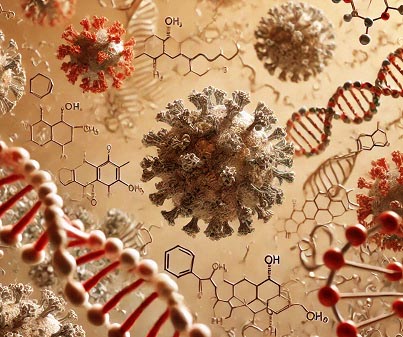French study shows that CGRP shows potential in inhibiting COVID-19 virus replication
Nikhil Prasad Fact checked by:Thailand Medical News Team Aug 22, 2024 7 months, 4 weeks, 1 day, 11 hours, 20 minutes ago
COVID-19 News: CGRP: A New Player in the Fight Against COVID-19
Recent research spearheaded by scientists from the Cochin Institute in Paris has unveiled a promising discovery in the ongoing battle against COVID-19. The study explores the role of a neuropeptide called Calcitonin Gene-Related Peptide (CGRP) in inhibiting the replication of the SARS-CoV-2 virus, particularly in the lungs of critically ill COVID-19 patients. This
COVID-19 News report delves into the findings of this groundbreaking research and its implications for future COVID-19 treatments.
 CGRP shows potential in inhibiting COVID-19 virus replication
CGRP shows potential in inhibiting COVID-19 virus replication
Image: AI Generated by TMN
Understanding CGRP and Its Role in the Lungs
CGRP is a neuropeptide found abundantly in the airways, known for its immunomodulatory, vasodilatory, and antiviral properties. While CGRP’s role in various pulmonary diseases has been studied, its direct impact on SARS-CoV-2 infection was previously unclear. The study team set out to investigate whether CGRP levels in the lungs of COVID-19 patients had any correlation with viral replication and disease severity.
Key Findings of the Study
The researchers analyzed plasma and bronchoalveolar lavage (BAL) samples from a cohort of COVID-19 patients with varying degrees of illness. They discovered that CGRP levels were significantly elevated in critically ill patients, particularly during the early stages of infection when the virus was still present in the lungs.
Interestingly, as the virus was cleared from the lungs, CGRP levels returned to baseline, suggesting a strong link between CGRP levels and viral presence.
This study highlights how CGRP not only correlates with viral presence but also directly inhibits the virus's replication in lung cells. The researchers used bronchial epithelial Calu-3 cells, which are known to be susceptible to SARS-CoV-2 infection, to test CGRP’s efficacy. The results were promising: CGRP and its stable analog, SAX, were able to significantly reduce viral replication in these cells. The inhibition was dose-dependent, meaning that higher levels of CGRP resulted in greater suppression of the virus.
Mechanisms of Action
The study further investigated how CGRP exerts its antiviral effects. The researchers found that CGRP interacts with its receptor on the surface of lung cells, leading to the downregulation of key receptors that SARS-CoV-2 uses to enter and infect cells. Specifically, CGRP reduced the expression of ACE2 and TMPRSS2, two critical proteins that facilitate the virus's entry into lung cells. By reducing the availability of these entry points, CGRP effectively limits the virus's ability to spread within the lungs.
Another intriguing aspect of the study is the timing of CGRP’s action. The researchers observed that CGRP was effective both when administered before and after viral exposure. This suggests that CGRP could be beneficial not only in preventing infection but also in treating active infectio
ns, making it a versatile tool in the fight against COVID-19.
Implications for Future Treatments
The findings of this study open up new avenues for the development of COVID-19 treatments. CGRP-based therapies could potentially be used to manage COVID-19, especially in critically ill patients where viral replication in the lungs poses a significant threat. The fact that CGRP is naturally present in the body and can be enhanced with stable analogs like SAX adds to its appeal as a therapeutic agent.
However, the researchers caution that further studies are needed to fully understand the potential of CGRP in treating COVID-19. They suggest that future research should focus on determining the optimal dosing and administration methods for CGRP-based therapies, as well as exploring its effects in different stages of the disease and in various patient populations.
Conclusion
This study sheds light on a previously unexplored aspect of COVID-19 pathology: the role of CGRP in inhibiting SARS-CoV-2 replication. By revealing that elevated CGRP levels correlate with reduced viral presence in the lungs, the research offers hope for new treatment strategies that could complement existing therapies. As the fight against COVID-19 continues, the potential of CGRP to serve as both a preventive and therapeutic agent is an exciting development that warrants further exploration.
The study findings were published in the peer-reviewed Journal of Virology.
https://journals.asm.org/doi/10.1128/jvi.00128-24
For the latest
COVID-19 News, keep on logging to Thailand Medical News.
Read Also:
https://www.thailandmedical.news/news/covid-19-news-new-insights-into-ribosomal-frameshifting-mechanisms-of-coronaviruses-including-sars-cov-2
https://www.thailandmedical.news/news/cd81-fusion-protein-enhances-sars-cov-2-spike-trafficking-and-immune-response
